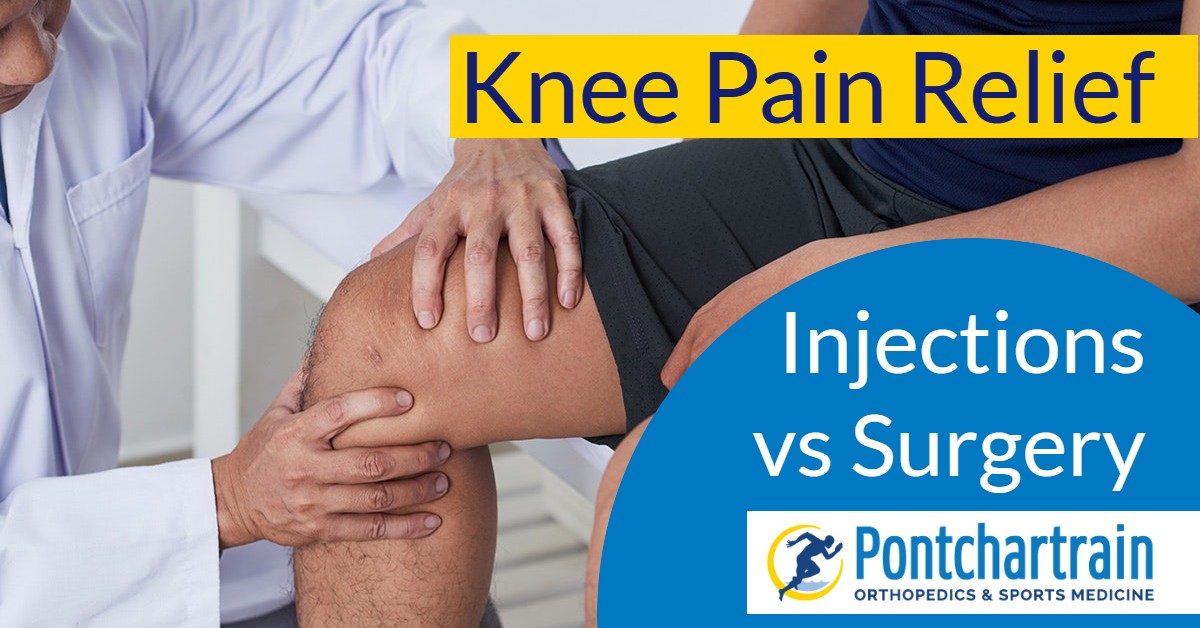Knee Pain Relief: Injections VS Surgery

In the search for knee pain relief, patients have a wide spectrum of options to consider. However, balancing concerns about the loss of mobility against the thought of multiple surgeries or even a full knee replacement can be overwhelming. In today's post, Dr. Joe Finstein explains the logic behind treatment options ranging from ice and rest to a total replacement.
Understanding Knee Pain
The first step towards real knee pain relief is first understanding the root cause of your pain. Knee pain can be caused by a recent injury, an event that happened decades ago or a degenerative condition.
Common injuries include those to the articular cartilage, anterior cruciate ligament (or ACL), a torn meniscus, damage to tendons or ligaments surrounding the joint. Knee pain can also be the result of excess weight, flexibility issues, or inactivity.
ACL tears are sudden and can generally be traced to a specific incident that caused undue stress on the knee. Meniscus tears are usually the result of some sort of load injury and often occur by a sudden twist or rotation of the knee during physical activity. The range of possible degenerative conditions which can be caused by inflammation or autoimmune disease includes rheumatoid arthritis, gout, or pseudogout but the majority of arthritis cases are simple osteoarthritis. The cumulative effect of past injury and time creates traumatic arthritis, where a patient had some previous injury or surgery that has expedited the wear-and-tear process.
“The first step towards real knee pain relief is first understanding the root cause of your pain. Knee pain can be caused by a recent injury, an event that happened decades ago or a degenerative condition.”
Minimally Invasive Treatments vs Surgery
There is no one size fits all treatment path for knee pain relief. Every patient is different. Depending upon the cause of your knee pain, your age, and the current condition of your knee, your treatment options can vary greatly. The biggest mistake patients make is putting off having their knee pain evaluated by a specialist.
Braces
In today's media, braces are often advertised as a cure for all joint pain. In reality, braces are often used as one of many prongs of treatment. However, not all knee braces are helpful. For instance, patients who are diagnosed with patella (knee cap) pathology require a different brace compared to patients with osteoarthritis.
Physical Therapy
If you're dealing with persistent pain with a stable, relatively healthy knee, we usually recommend starting with conservative treatment: ice, rest, bracing, over-the-counter pain relievers, prescription anti-inflammatories and physical therapy. Patients will also be instructed to perform rehabilitation including stretching to promote proper healing and strengthening the muscles that support the knee. For many of us in South Louisiana, weight loss is often a recommended treatment.
Injections to Reduce Inflammation and Promote Healing
Knee replacement alternatives, such as stem cell therapy, platelet rich plasma therapy (PRP), and Corticosteroid injections can alleviate pain stemming from overuse, injury, autoimmune disorders, and degenerative arthritis without surgery.
Stem cell knee therapy
Stem cell knee therapy uses a method known as autologous transplantation, where cells are extracted from your bone marrow or fatty tissue, processed, and immediately injected into the damaged knee. This encourages the damaged cartilage to heal and can also reduce inflammation.
Platelet-Rich Plasma (PRP) Therapy
Platelet-Rich Plasma (PRP) Therapy uses a process by which your own blood is drawn and centrifuged to separate the red blood cells and plasma, leaving behind a rich concentration of platelets, white blood cells, and growth factors. This concentrate is then injected into the damaged knee, which can facilitate an accelerated healing response with minimal or no scarring, and may alleviate further degeneration of the tissues.
Steroid Injections
Corticosteroid injections are among the most common knee injections. The doctors at Pontchartrain Orthopedics & Sports Medicine inject corticosteroids directly into the knee joint to help relieve knee pain and inflammation quickly. Injection therapy provides rapid relief to the inflamed area and is more powerful than traditional oral anti-inflammatory medications.
Arthroscopic surgery
Knee arthroscopy is a surgical technique that can diagnose and treat problems in the knee joint. During the procedure, a pinkie nail incision will be made in order to insert a tiny camera — called an arthroscope — into your knee to view the inside of the joint on a screen. Dr. Finstein can then investigate a problem with the knee and, if necessary, correct the issue using small instruments within the arthroscope.
Arthroscopy can provide knee pain relief from conditions such as a torn meniscus or a misaligned patella (kneecap). It can also give Dr. Finstein an opportunity to not only diagnose, but also repair the ligaments of the joint. There are limited risks to the procedure and the success rate is high for most patients.
Partial or Full Knee Replacement
The type of knee replacement surgery you may need will depend upon the condition of each part of the knee. Knee joints can be divided into three parts, or “compartments.” The medial compartment is located on the inside of the knee, while the lateral compartment can be found on the outside portion. The final compartment, the patellofemoral compartment, is the portion of the joint between the kneecap and the thigh bone.
In cases where only one compartment of the knee is damaged, it may be possible to perform a partial knee replacement. If two or three compartments are damaged, then it is often recommended that a full knee replacement take place. A full replacement might also be necessary if there is advanced arthritic damage causing significant deformity.
Thanks to POSM’s pioneering robotic knee replacement technology, patients can walk immediately after surgery and go home with minimal interruption to their everyday lives.
“Thanks to POSM’s pioneering robotic knee replacement technology, patients can walk immediately after surgery and go home with minimal interruption to their everyday lives.”

What is the best treatment option for you?
After an individual diagnosis has been made, we will then discuss your individualized knee pain relief treatment options and risk-reduction plans.
If surgery is the chosen treatment, you can experience the benefit of a quick recovery whether you need full or partial knee replacement surgery thanks to POSM’s robotic knee surgery capabilities. Robotic surgery uses specialized computer programs to customize procedures for your needs which are more minimally invasive. This means that as a POSM patient you will recover more quickly and experience less post-op pain.
Does your knee hurt? Don’t make the mistake of trying to figure out a diagnosis on your own. Call today to set up an appointment to schedule an appointment with a knee pain specialist today.
About the Doctor

Dr. Joseph L. Finstein, MD
Joseph L. Finstein, MD specializes in sports medicine, focusing on shoulder, elbow, hip, knee, foot, and ankle injuries. Dr. Finstein completed his Sports Medicine Fellowship at the Rothman Institute at Thomas Jefferson University He is currently the team physician at De La Salle High School. Prior to joining Pontchartrain Orthopedics & Sports Medicine, Dr. Finstein assisted in the care of athletes from the Philadelphia Eagles, Flyers, Phillies, Soul and St. Joseph’s University.
This website is not designed to and does not provide medical advice, medical diagnosis, professional opinion, treatment or services to you or any other person. Through this website and links to other websites, Pontchartrain Orthopedics & Sports Medicine provides general information for educational purposes only. The information provided in this website, or through links to other sites, is not a substitute for medical care. You should not use this information in place of a visit, call, consultation or the advice of your healthcare provider. Pontchartrain Orthopedics & Sports Medicine is not liable or responsible for any advice, course of treatment, diagnosis or any other information, services or product you obtain through this site.
